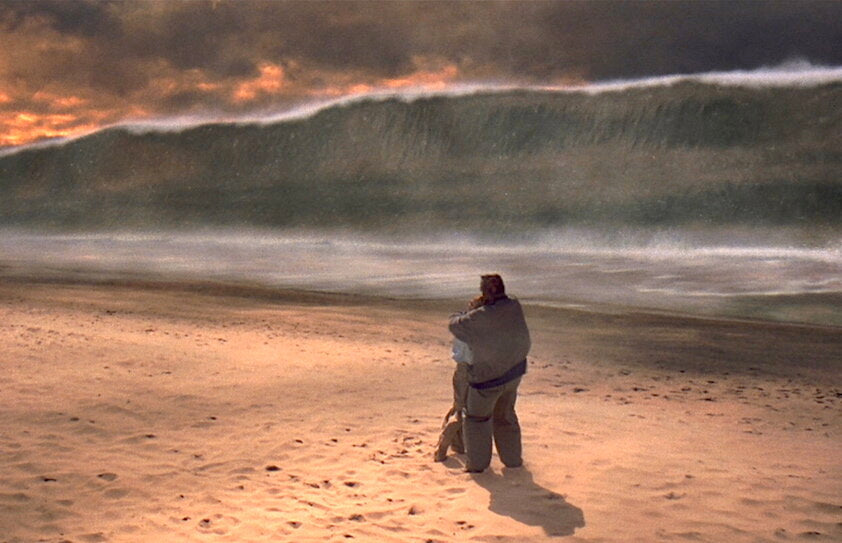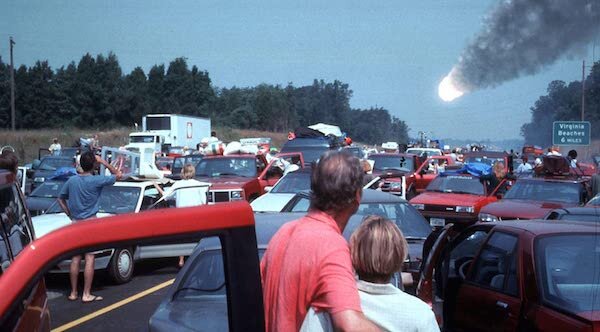Mimi Leder’s 1998 apocalypse action thriller Deep Impact, understands and encapsulates a collective human fear regarding the end of the world. Its effect, however, can be complex beyond just signalling oblivion: Rafaela Sales Ross looks back at how the film helped her confront superstitions and find comfort in the end of the world.
It was June 6th 2006, and I was at the height of 11 years old. A teacher had just left the classroom to enlist help since she alone could not convince me to get out from under her desk, my fists clenched in fear, my eyes tensely shut. The date was one I dreaded for months, a lifetime at my age. Some older kids had told me it was impossible to escape the obvious: 6/6/06, the day of the devil, the day of doom. According to them, on that fateful Tuesday morning, the skies would suddenly darken and a hole would consume everything in our reach, ending life and erasing the world once and for all.
Living in a small rural town in Brazil, scorpions had loomed under my bed, spiders were so common my siblings and I could differentiate them based on size and, at age five, we learned how to avoid small grass snakes. But there was something no home tricks or generational customs could help me with: the end of the world. From as long as I could picture myself, I nurtured this irrational fear of the impending doom. As a six-year-old going on 60, I contemplated the never-ending fields that rested outside the tired wooden windows of our quiet house, wondering when the inevitable would hit our secluded corner on Earth. There was no discussion with my tough-headed young self: the world was ending. And it was going to do so before I had the chance to see it.
June 6th came and went and, to my utmost surprise, everything still looked very much the same. No sign of dark holes in the sky, life went on as it always did. The only thing to come out of it was that my parents were summoned to school to discuss my "odd behaviour". At home, I followed my daily ritual of catching up with whichever movie was on TV. Lying on the well-worn sofa, I watched as young teens stared deeply into the sky through their second-rate telescopes; unaware they were about to change the fate of humankind. It didn't take much to get me hooked. By the time Téa Leoni strutted confidently into the MSNBC newsroom, Deep Impact had my undivided attention.
*
The summer of 1998 indulged the disaster movie. Mimi Leder's Deep Impact and Michael Bay's Armaggedon flashed their star-studded casts, competing for box office numbers that ultimately favoured the latter. In my living room, however, the politics were as irrelevant as they could be. Eight years after its original release, Deep Impact felt as fresh and wonderful on my little TV as it had once been on the big screen.
The film’s premise is simple: Jenny Lerner (Téa Leoni), an eager young journalist, stumbles upon a government scandal she believes to be related to a cheating politician, only to find out the United States are secretly preparing for an "extinction-level-event". As a Mount Everest-sized comet makes its way towards Earth, the US President enlists some of the country's top space travellers (plus a Russian addition for diplomatic purposes) to plant nuclear bombs in the meteor in an attempt to destroy it before it completes its trajectory.
"It's liberating knowing I won't get called. I’ve never been happier."
The Lerners are your typical post-divorce American family: Robin, who heavily relies on the sun-basked memories of better days; Jason, who moved on with a woman half his age; and Jenny, the daughter who strongly resents her father for abandoning her mother. Paradoxically, Robin's freedom comes in the shape of a TV announcement stating she is over the age cut for making into a government-built modern version of Noah's Ark. Realising her days are numbered, a sense of bliss overcomes her. She welcomes death on her own terms, tenderly clinging to the past yet fully embracing the cathartic peace of permanent finality.
Robin's departure leads her daughter to a similar sense of emotional relief. At the peak of her career as the designated face of doomsday-news, Jenny relinquishes a chance of survival and runs to a place where she once tasted pure, untarnished joy. By the beach, at her childhood holiday home, she finds her father staring at the ocean, placidly waiting for the meteor to hit. Running into his arms, she regresses to infancy, wanting nothing more than to be told all will be okay. "Daddy," she pleads, grabbing her father's collar as a massive wave rapidly moves towards the both of them. Just like her mother, she bids farewell to life engulfed, literally and figuratively, by resolution.
'When this ultimate crisis comes... when there is no way out - that is the very moment when we explode from within and the totally other emerges: the sudden surfacing of a strength, a security of unknown origin, welling up from beyond reason, rational expectation, and hope.'
― Émile Durkheim
As I repeatedly found myself coming back to Deep Impact over the years – evolving from swooning over Elijah Wood to adoring Téa Leoni – it dawned on me that, as we walk through life, we witness the end of the world time and time again. First, we wave goodbye to the world we know, then the one we have envisioned and, ultimately, the one we built; a perpetual sequence of small apocalypses that beautifully shape our existence. Leder fully encapsulates the comfort of the formulaic, to craft a tender chronicle of grief and hope that shifted my paralysing fear into a yearning for a deeper understanding of some of our most inherent human traits, such as the unfathomable complexity of familial bonds and the noble sense of morality that fervently draws us to sacrifice.
Eventually, I stopped looking for shelter. Instead, I allowed myself to only occasionally dip into existential dread while simply moving along. One day at a time. I decided to live as someone who was not going to make it into a metaphoric Noah's Ark, and, slowly but steadily, found beauty in the ephemeral. What Deep Impact presented me with was the invaluable realisation that I'd rather stay and watch the wave take over it all – if only allowed to do so in the warm embrace of the ones I loved.
Rafaela Sales Ross (@rafiews) is a proud Brazilian currently living in Scotland. She has a Masters in Film and Visual Culture and is a researcher of the portrait of suicide on film. Rafa, as she likes to be called, loves Harold and Maude and writing about the exploration of death, existence and legacy on film.


